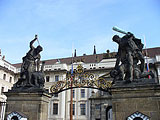Prague: Political Energy, Wasted
By Jeremy Druker for ISN
It’s hard not to feel at least a little sorry these days for Mirak Topolanek, the former Czech prime minister - even if you aren’t a supporter of the country’s right-wing Civic Democrats or even a supporter of the recently scrapped plans to station part of a US missile defense system in the Czech Republic.
Topolanek was one of the biggest boosters of the plan while he was in office until March of this year, when he lost of a vote of no-confidence and turned over the reins to an interim, caretaker government. Despite facing a Czech public largely against the idea of placing a radar station 90 kilometers southwest of Prague - and one of the largest civic movements since the fall of communism two decades ago - Topolanek never wavered.
The government’s strategy for convincing the public was muddled and largely ineffective, but the then-prime minister stuck to his message that the Czech Republic would increase its security and would also prove its reliability as an ally to the US and the rest of the western world.
And the effort was considerable and time consuming. For months, discussions raged over whether Topolanek could cobble together enough parliamentary deputies to pass the legislation needed to actually allow the station to be constructed and then manned by American soldiers (officially signing the deals with the US had turned out to be the easy part).
Politicians, analysts and the media constantly did the math, over and over again, playing with the numbers and trying to figure out who would vote for and against. Polemics filled the pages of newspapers and magazines, assessing the real threat of the ‘rogue’ states the missile system would supposedly defend against, the wisdom of antagonizing Russia (which opposed the US plan from the start), and the role a small state like the Czech Republic should play in international politics.
In the midst of the debate, the issue of whether all this energy was worth expending since a new US president might overturn any decision, rarely, if ever came up. Czech politicians seemed to think - no matter what - a deal with the US was a deal, and that something as essential as a missile defense plan would survive, no matter the administration.
Partly that may have been because many Czech leaders believed that the US wouldn’t let something like cost get in the way, or, heaven forbid, a desire to appease Russia. After standing up against Moscow for the duration of the Cold War, Washington wouldn’t make a decision based on what Vladimir Putin wanted - or so they thought.
Seeing the issue through an anti-Russian lens might then have been one reason why Topolanek and others always seemed so confident in missile defense, and even dismissive of the idea that Obama might have his doubts. And, in the end, some Czechs, including major media, interpreted the decision as a second Yalta of sorts. “No Radar. Russia Won,” blared a headline announcing the news in Mlada fronta DNES, the country’s most popular serious newspaper.
So one may admire Barack Obama for following his own instincts and discarding his predecessor’s pet project, but one should hope that behind closed doors, Topolanek has been receiving thanks for expending so much political capital for what turned out to be nothing.

